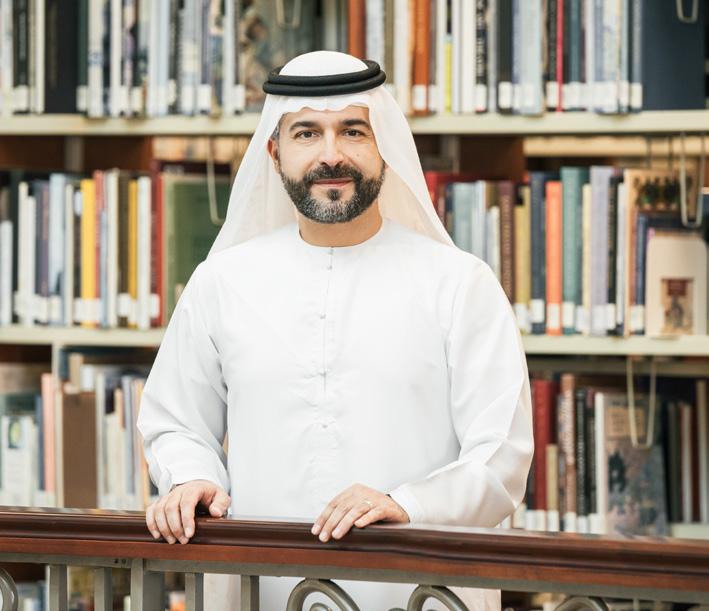
8 minute read
DR. FADI ALOUL LEADING FROM THE FRONT
“Choose a field that makes a difference and excites you to go to work every day” is not only the advice that Dr. Fadi Aloul gives his Computer Science and Engineering (CSE) students at the American University of Sharjah (AUS). He also lives by it.
For the past 18 years, Dr. Aloul’s pursuit of fruitful collaboration and enrichment of university education in the UAE has helped him become one of the country’s most-highly awarded academic leaders and most-cited researchers. The Emirati Professor and Head of the CSE Department at AUS is among the UAE’s top three in the field of engineering and technology on Scopus, based on field-weighted citation impact, and a recipient of major international and local academic awards.
Advertisement
Dr. Aloul began his dive into engineering at the Lawrence Technological University in Michigan in the United States, where he graduated with a Bachelor of Science in Electrical Engineering Summa Cum Laude. For his Master of Science in CSE, he transferred to the University of Michigan, Ann Arbor, and it was there that Dr. Aloul first discovered the passion for teaching that has since guided his academic leadership.
“I was given a teaching assistantship role and began teaching classes. Seeing the students’ interest and excitement in the material I was presenting was surprisingly fun and rewarding. I really enjoyed it. That was when I decided I would join academia instead of industry after graduation,” he shared.
After receiving his MSc in CSE, Dr. Aloul stayed on at the University of Michigan, Ann Arbor, for his doctorate. There, he developed expertise in his first major area of research – Boolean Satisfaction Problems (SAT) algorithms and applications – which deal with decision and optimization problems that arise in various engineering and computer science applications. This research field came to dominate the early part of Dr. Aloul’s research career, accounting for a third of his total 135 peer-reviewed published papers. SAT algorithms is also the area of research in which Dr. Aloul has co-filed a United States patent in 2004, for a method of verification using SAT algorithms.

Dr. Aloul returned to the UAE after his doctorate, where after a brief stint at the American University of Dubai, he joined AUS as an assistant professor in the CSE Department in 2004. In that role, he was put in charge of teaching a different subfield of computer science and engineering, cybersecurity. This gave him the opportunity to expand his research interests into an area of strategic importance to the UAE, which has a National Cybersecurity Strategy and Cybersecurity Council.
“We started looking into different areas of cybersecurity, like smart grid security, cyber-physical systems security, Internetof-Things security, and general security awareness issues. One of my most-highly cited papers is in this field,” Dr. Aloul recalled. The paper is titled “Two Factor Authentication Using Mobile Phones”, and it has been cited 314 times since it was published. It detailed a novel method for authenticating access using a mobile phone-based software token system, to replace existing hardware and computerbased software tokens.
Around the same time that this highly cited paper was published, Dr. Aloul received the first major recognition of his academic career – the 2009 Khalifa Award for Higher Education. This award is given by His Highness Sheikh Khalifa bin Zayed Al Nahyan, President of the UAE and Ruler of Abu Dhabi, to one UAE university faculty each year for excellence in teaching, research, and service.
Two years later, Dr. Aloul received AUS’s inaugural Excellence in Teaching Award, given to one faculty from the College of Engineering each year. In 2013, he received the Abdul Hameed Shoman Award for Young Arab Researchers in the category of Mathematics & Information Technology.
Another year later, Dr. Aloul received an early promotion to the rank of full professor, an achievement that was recognized through the Sheikh Rashid Award for Outstanding Scientific Achievement. Taking on a more senior role in the CSE Department also deepened Dr. Aloul’s involvement with developing CSE students, which led to his third area of research expertise – applied engineering.

“Every CSE student has to do a one-year graduate project and I always advise them to pick projects that contribute to their community and have a real impact. What I noticed is that while theoretical research may be too advanced for undergraduate students, they are very much interested and capable of developing applied engineering projects, particularly to develop apps for health, safety, and environmental monitoring. As an advisor for many such applied engineering projects, it became one of my areas of research expertise,” he recalled.
Dr. Aloul has since advised and coauthored papers on many projects that leverage the computing and sensing power of smartphones and machine learning to solve challenging problems. One of his most-cited papers in applied engineering uses the computational power and portability of smartphones to diagnose obstructive sleep apnea (OSA), which is a serious sleep disorder where the upper airway becomes obstructed during sleep and causes oxygen desaturation. The paper was published in the Journal for Biomedical Informatics in 2014.
The system Dr. Aloul and his collaborators developed gathered data from the smartphone’s built-in microphone to record respiratory effort, the smartphone’s built-in accelerometer to record body movement, and an external oximeter to measure oxygen levels. The data gathered from these sensors was processed by a customized application housed on the smartphone that analyzed the results against information collected about the user through a questionnaire. The app determined the likelihood of OSA and reported the finding to the user. When tested for accuracy, their novel system was found to be as accurate as the current gold standard for OSA diagnosis, which is overnight Polysomnography, without requiring sleep lab-based observation using specialized equipment.

While teaching cybersecurity and advising students at AUS, Dr. Aloul had also begun work on the project that resulted in perhaps his most significant career achievement to date – receipt of the 2015 Global Engineering Deans Council (GEDC) Airbus Diversity Award. The prestigious award is given to one faculty worldwide for their efforts to promote diversity in engineering education, and Dr. Aloul received it for his leadership in redeveloping AUS’s Introduction to Engineering and Computing course.
“Right after I joined AUS, I began championing the Intro to Engineering and Computing course. This is a course that all engineering freshmen have to take, which makes it particularly important. We wanted to make a course that was exciting and provided a real and meaningful introduction to the various specializations of engineering,” he recalled.
Dr. Fadi Aloul, Professor and Department Head of Computer Science and Engineering American University of Sharjah
Working with his colleagues in the College of Engineering, Dr. Aloul led a years-long redesign process to overhaul the course. The final course covered a wide range of engineering topics and applications, with a focus on group projects to enable problemsolving, innovation, and collaboration, in addition to developing their soft skills. It also integrated technology in class to increase student engagement. The course has 15 instructors teaching hands-on labs, engaging lectures, and leading research challenges. They teach about 800 AUS students each year. A paper on the revamped course was published in the European Journal of Engineering Education in 2015.
“While nearly every university has such a class, what makes ours special is the sheer amount of content it covers, that not only introduces freshmen engineering students to the field, but really gets them excited about what they can study and achieve. And though I may have been the one listed on the GEDC award, I have to give credit to the College of Engineering administration and team that helped support, develop, and deliver the course. We are all only as good as our teammates, and I have been blessed to be part of excellent teams,” Dr. Aloul stated.
In 2016, Dr. Aloul achieved another career milestone when he was promoted to Head of the CSE Department at AUS. In the intervening five years, he has overseen a doubling of enrollment in the department.

“The CSE Department is now the largest at AUS. The major reason for this is that we have an excellent team that has helped us connect with the needs of students, alumni, industry, and the wider community. We promote a culture of excellence among faculty, staff, and students, by identifying how they can make an impact and push the department forward. As part of this, we have revamped the curriculum to add needed electives in topics of interest to students and the market, digitized many of our student services to improve the students’ learning and university experience, developed several professional industrial academies to empower our students, established student and employer web portals for easier communication, developed state-of-the-art labs, and launched aggressive recruitment and outreach programs to engage with high school students, alumni, and industry professionals,” he said.
All of this – advising on high-impact research, winning international and national awards, and developing a highly successful model for a CSE Department – contribute to Dr. Aloul’s larger goal, which is to make the UAE stand out in the international advanced educational sector.
“I hope to contribute to the achievement of a UAE university on the global list of the top 50 universities. Right now, we have some in the top 200, but I believe the top 50 is achievable if we push hard enough. For that, we need all the efforts to come together,” he revealed.
That is the meaningful challenge that continues to make Dr. Aloul excited to work in his field of advanced engineering education, and the one that he is striving to achieve.







